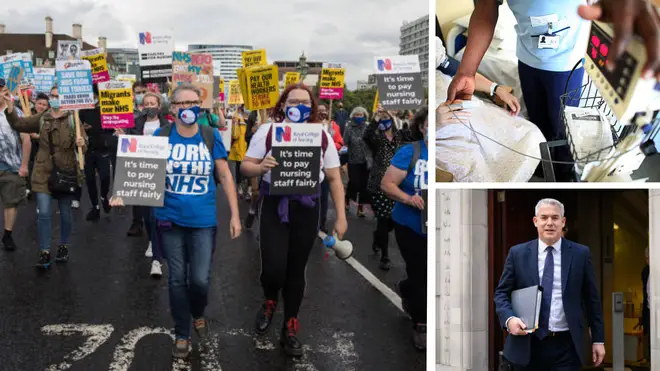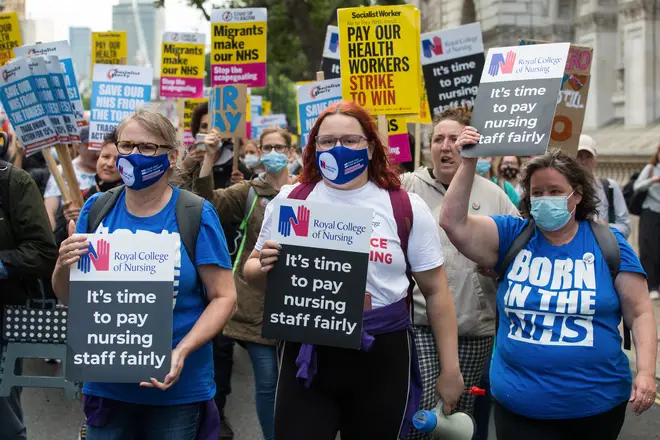
Henry Riley 7am - 10am
12 December 2022, 21:23 | Updated: 13 December 2022, 00:44

Thousands of patients are set to have operations cancelled, and tens of thousand more will miss out on appointments, after nurses decided to go ahead with a strike.
As many as 100,000 nurses will go on strike for the first time in 105 years this Thursday and next Tuesday, after talks between their union and the government over pay demands broke down.
That means that some 6,000 people waiting for non-urgent operations will be told their surgeries have to be rescheduled.
And as many as 64,000 more people with outpatient hospital appointments, including cancer check-ups, will also have to wait longer to be seen because of the strikes.
And Royal Mail strikes are causing further headaches for patients, who would normally get letters in the post telling them their operation was being rearranged with at least two days' notice.
But because many postal workers are on strike, NHS staff are having to spend the day on the phones telling people their surgeries are not going ahead.
That means that some people will not find out until the day of the strike whether or not they will be going under the knife that day.
Ministers have said that people should still try to seek medical treatment if they need it on the days of the strike. NHS bosses are currently trying to get nurses to staff accident and emergency centres, even on strike days, even though nurses who treat minor injuries and help sort A&E patients are planning to take part in the strike.
Strike committees can call nurses off picket lines to help with seriously ill patients in a medical emergency. Soldiers have also been drafted in to help with the crisis, although there are only 40 medically trained paramedics available.
Miriam Deakins, director of policy and strategy at NHS providers, said NHS trusts were "putting plans in place to maintain safety" on the strike days.
She said: “Trusts have been rescheduling operations and appointments. They will try to give patients at least a couple of days’ notice if their operation is to be rescheduled.”
She added:“If patient safety is at risk during the day, local strike committees can call nurses off the picket lines.”
She said that “some patients may regrettably see operations or appointments cancelled on the day”, adding: “The weather is not helpful. We see a general uptick in pressures during cold snaps. There will be more pressures on A&E, and strep A concerns at the moment understandably mean lots of worried parents and children.”
The Royal College of Nursing (RCN) wants a five percent pay rise above retail inflation for its members, meaning a hike of 19.2 percent.
Every one percent increase in salaries costs £700 million, making the total government cost for meeting the demand in the region of £10billion – 6.5 percent of the total NHS budget.
The union's general secretary Pat Cullen said health secretary Steve Barclay refused to discuss pay with her in 11th-hour talks ahead of the strikes.
The government has maintained that NHS pay must be decided by an independent review - not by ministers.
In a statement, Ms Cullen said: "The Government was true to its word - they would not talk to me about pay.
"I needed to come out of this meeting with something serious to show nurses why they should not strike this week. Regrettably, they are not getting an extra penny.

Nurses 'can't afford to go on as we are'
"Ministers had too little to say and I had to speak at length about the unprecedented strength of feeling in the profession.
"I expressed my deep disappointment at the belligerence - they have closed their books and walked away."

Mr Barclay told Ms Cullen that pay increases for nurses would take money from frontline services, according to reports.
A department of health and social care source told the PA news agency: "He again listened to the RCN's position on pay and reiterated the Government has agreed to the recommendations of the independent pay review body and prioritised the National Health Service with £6.6 billion of investment over the next two years.
"He said that any further pay increase would mean taking money away from frontline services and reducing the 7.1 million elective backlog.
"Mr Barclay said he would continue to engage with the RCN around non pay-related issues and challenges the union has with the pay review process."